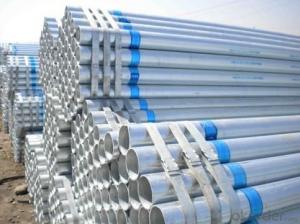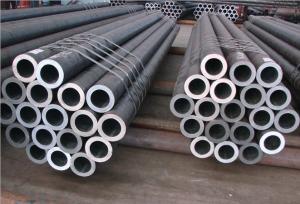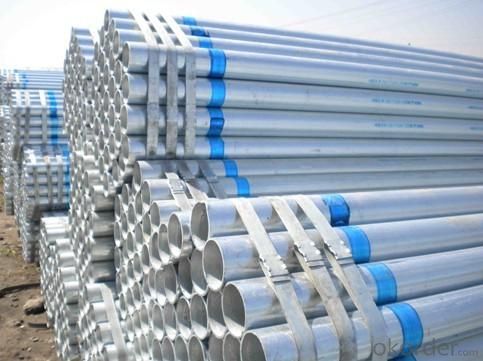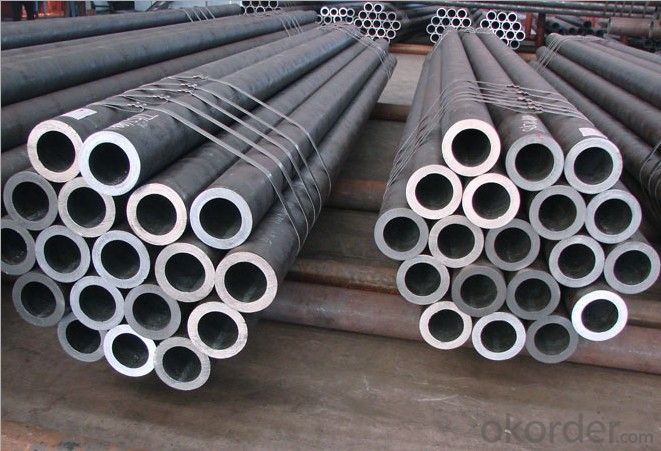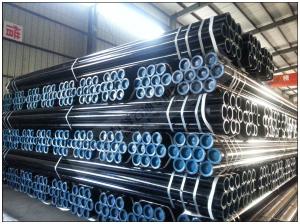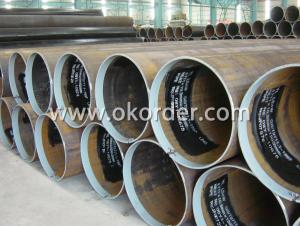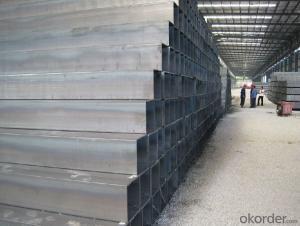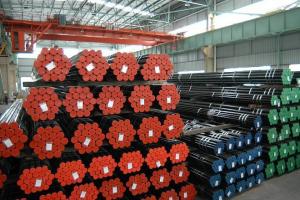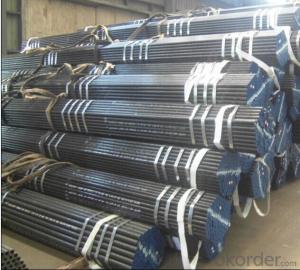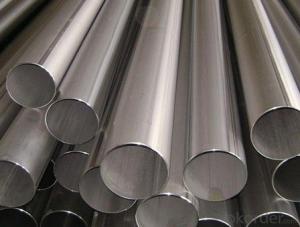API 5L Galvanized Seamless Steel Pipe/Tube
- Loading Port:
- Tianjin
- Payment Terms:
- TT or LC
- Min Order Qty:
- 25 m.t.
- Supply Capability:
- 10000 m.t./month
OKorder Service Pledge
OKorder Financial Service
You Might Also Like
We are company that have many years experience and professional manager team and engineer team and sales team, sure we will provide you high quality of pipe and professioanl service.
Seamless pipe possesses a hollow section and without seam around the strip steel. It is made with solid bar or steel ingot by perforating machine. As the facture process does not include any welding, seamless pipes are considered to be stronger and more durable. Generally speaking, seamless pipe has better pressure resistance and security than other classifications, and was usually more easily available than welded pipe.
2、Main Features of the Seamless Pipe:
• High working accuracy
• High strength
• Small inertia resistance
• Strong therming dissipine ability
• Good appearance
• Reasonble price
3、Seamless Pipe Specification:
Standard | GB, DIN, ASTM ASTM A106-2006, ASTM A53-2007 |
Grade | 10#-45#, 16Mn 10#, 20#, 45#, 16Mn |
Thickness | 8 - 33 mm |
Section Shape | Round |
Outer Diameter | 133 - 219 mm |
Place of Origin | Shandong, China (Mainland) |
Secondary Or Not | Non-secondary |
Application | Hydraulic Pipe |
Technique | Cold Drawn |
Certification | API |
Surface Treatment | factory state or painted black |
Special Pipe | API Pipe |
Alloy Or Not | Non-alloy |
Length | 5-12M |
Outer Diameter | 21.3-610mm |
Grade | 20#, 45#, Q345, API J55, API K55, API L80, API N80, API P110, A53B |
Standard | ASME, ASTM |
1) Material:20#(ASTM A 106/A53 GRB.API5LGRB,GB),45#,16Mn,10#.
2) Specification range: OD: 21.3-610mm, WT:6-70mm, length:6-12m or according to the requirement of clients.
3) Executive standards: GB, ASME API5L.ASTM A 106/A53,Despite of the above standards, we can also supply seamless steel pipe with standard of DIN, JIS, and so on, and also develop new products according to the requirements of our clients!
4) Surface: black lacquered, varnish coating or galvanized.
5) Ends: Beveled or square cut, plastic capped, painted.
6) Packing: bundles wrapped with strong steel strip, seaworthy packing.
4、Packaging & Delivery:
Packaging Details: | seaworthy package, bundles wrapped with strong steel strip |
Delivery Detail: | 15-30days after received 30%TT |
5、FAQ of Seamless Pipe:
①How is the quality of your products?
We have many years business experience in this area, and we have professional engineer and manager team and sure we can provide you high quality production and professional service.
②How about price?
Yes, we are factory and be able to give you lowest price below market one, and we have a policy that “ for saving time and absolutely honest business attitude, we quote as lowest as possible for any customer, and discount can be given according to quantity”,if you like bargain and factory price is not low enough as you think, just don’t waste your time.Please trust the quotation we would give you, it is professional one.
③Why should you chose us?
We can give you both.Additionally, we can also offer professional products inquiry, products knowledge train(for agents), smooth goods delivery, exellent customer solution proposals.Our service formula: good quality+good price+good service=customer’s trust
SGS test is available, customer inspection before shipping is welcome, third party inspection is no problem.
6、Seamless Pipe Images:
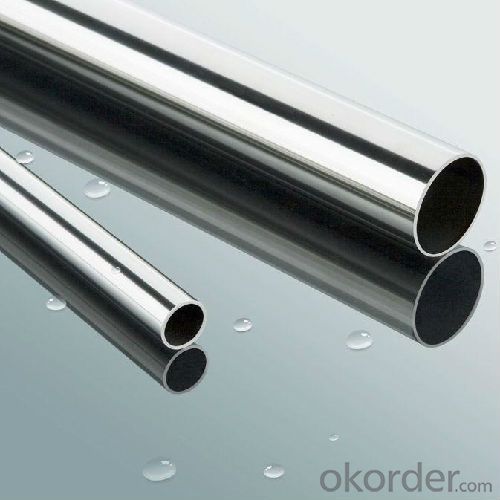
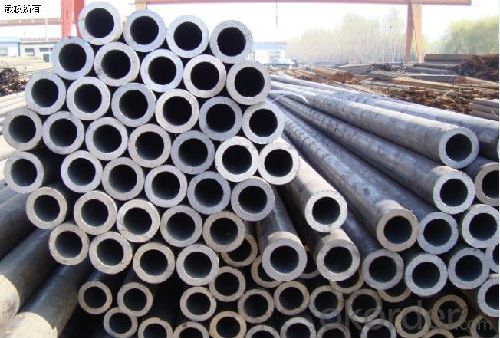
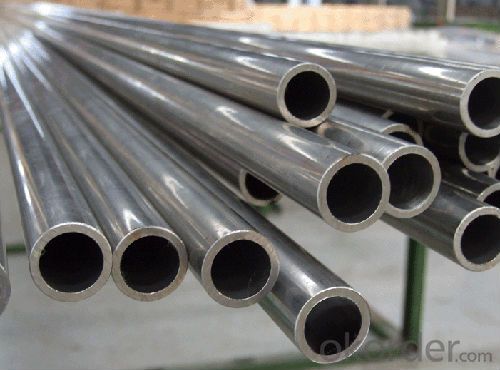
- Q: What is the difference between internal and external coating for steel pipes?
- Internal coating for steel pipes refers to the application of a protective layer on the inner surface of the pipe to prevent corrosion and increase durability. This coating is designed to withstand the flow of fluids or gases through the pipe, ensuring the integrity of the material and minimizing the risk of contamination. On the other hand, external coating for steel pipes involves applying a protective layer on the outer surface of the pipe to safeguard it from environmental factors such as moisture, chemicals, or mechanical damage. This coating acts as a barrier, shielding the pipe from corrosion and extending its lifespan. In summary, internal coating focuses on protecting the inner surface of the steel pipe, while external coating aims to safeguard the outer surface. Both coatings are crucial for ensuring the longevity and reliability of steel pipes in various applications.
- Q: What is the impact of steel pipe size on flow rate and pressure?
- The steel pipe size has a significant impact on both the flow rate and pressure. A larger pipe size allows for higher flow rates by reducing the frictional losses, resulting in increased fluid velocity. This leads to higher pressure drops across the pipe due to the increased surface area exposed to the flowing fluid. Conversely, a smaller pipe size restricts the flow, causing higher pressure drops and lower flow rates. Therefore, selecting an appropriate pipe size is crucial to ensure optimal flow rates and pressure levels in a system.
- Q: What is DN50 for welded pipe?
- Refers to the use of welded steel pipe made of DN50 steel pipe, refers to the inside diameter is 50mm, the market of common DN50 pipe also refers to the 2 inch pipe, standard pipe: 3.5mm thickness, pipe diameter 60mm, the weight of 4.88kg/m theory. DN50 seamless steel pipe, commonly used in the market, has two specifications: 57mm, 60mm, and if no special instructions, 57mm is commonly used. The outer diameter of the welded pipe is only 60mm this specification.
- Q: How are steel pipes protected against chemical corrosion?
- Steel pipes are protected against chemical corrosion through various methods such as coating them with corrosion-resistant materials like epoxy or polyethylene. Additionally, cathodic protection techniques like applying sacrificial anodes or using impressed current systems can also be employed to prevent chemical corrosion on steel pipes.
- Q: How are steel pipes tested for quality assurance?
- Steel pipes are tested for quality assurance through various methods including visual inspection, non-destructive testing (such as ultrasonic testing and magnetic particle inspection), mechanical testing (such as tensile strength and hardness testing), and dimensional checks. These tests help ensure that the pipes meet the required specifications, standards, and safety regulations, ensuring their durability, reliability, and performance in various applications.
- Q: Are steel pipes suitable for underground gas lines?
- Yes, steel pipes are suitable for underground gas lines. They are commonly used due to their strength, durability, and resistance to corrosion, making them a reliable choice for transporting and distributing gas underground.
- Q: Can steel pipes be used for water supply networks?
- Yes, steel pipes can be used for water supply networks. They are commonly used due to their durability, strength, and resistance to corrosion. However, proper coatings and maintenance are necessary to prevent rusting and ensure the quality of the water supply.
- Q: How are steel pipes used in agriculture?
- Steel pipes are widely used in agriculture for various purposes. One common application is irrigation systems. Steel pipes can be used to transport water from a water source, such as a well or a reservoir, to different areas of a farm. These pipes are durable and can withstand the pressure of water, making them ideal for long-distance water transportation. Additionally, steel pipes are also used for drainage systems in agriculture. They can be used to remove excess water from fields, preventing waterlogging and ensuring proper drainage. Steel pipes are resistant to corrosion, which is important in agricultural settings where they may be exposed to moisture and various chemicals. Moreover, steel pipes are used in the construction of greenhouse structures. They provide structural support for the greenhouse framework and allow for the installation of irrigation systems and other equipment. Steel pipes are strong, sturdy, and can withstand harsh weather conditions, making them suitable for greenhouse construction. Furthermore, steel pipes are utilized in livestock farming. They are commonly used to create fences and enclosures for animals, providing a secure and durable barrier. Steel pipes are also used in the construction of animal shelters and barns. In summary, steel pipes play a crucial role in agriculture. They are used for irrigation systems, drainage systems, greenhouse construction, and livestock farming. Their durability, strength, and resistance to corrosion make them an excellent choice for various agricultural applications.
- Q: How are steel pipes used in the manufacturing of ships?
- Steel pipes are used in the manufacturing of ships for various purposes, such as carrying fluids and gases, providing structural support, and facilitating efficient operation of the ship's systems. They are used for plumbing, ventilation, and firefighting systems, as well as for the construction of hulls and other vital components. Overall, steel pipes play a crucial role in ensuring the functionality and safety of ships during their construction and operation.
- Q: Can steel pipes be used for structural purposes?
- Yes, steel pipes can be used for structural purposes. Due to their high strength, durability, and resistance to various environmental factors, steel pipes are commonly used in construction for applications such as supporting structures, frames, and columns. They offer superior load-bearing capacity and are especially suitable for use in large-scale infrastructure projects.
Send your message to us
API 5L Galvanized Seamless Steel Pipe/Tube
- Loading Port:
- Tianjin
- Payment Terms:
- TT or LC
- Min Order Qty:
- 25 m.t.
- Supply Capability:
- 10000 m.t./month
OKorder Service Pledge
OKorder Financial Service
Similar products
Hot products
Hot Searches
Related keywords
